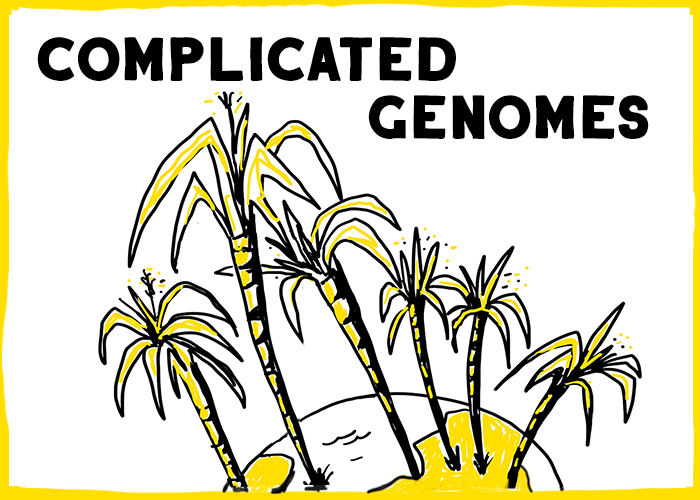Huntsville, Ala. — Noted scientist and geneticist Jay Shendure, M.D., Ph.D., was today presented with the 2014 HudsonAlpha Life Science Prize for his innovative work in the development and application of genomic technology, including completing a detailed sequence of DNA from HeLa cells, the first “immortal” human cell line grown in a lab.
The HudsonAlpha Life Sciences Prize recognizes outstanding achievements that exemplify one or more of the three key missions of HudsonAlpha—scientific discovery, economic development, and contributions to public science appreciation and education. Two prizes were awarded for 2014: Shendure received the award for early career scientists, while Mary-Claire King, Ph.D., will receive the recognition for career achievement on November 19.
“Jay Shendure’s work represents a remarkable example of the synthesis between technology development and genetic principles,” said HudsonAlpha President Rick Myers, Ph.D., who presented the award to Shendure.
An associate professor in the Department of Genome Sciences at the University of Washington, Shendure researches the development and application of new technologies in genomics and molecular biology, in particular next generation sequencing technologies. Shendure, who holds a Ph.D. in genetics from Harvard University and an M.D. from Harvard Medical School, is among the world’s most highly cited researchers in the field of molecular biology and genetics, with more than 130 publications detailing pivotal discoveries in modern genomic research methods and technologies.
“Next generation or massively parallel DNA sequencing technologies have the potential to markedly accelerate genetics research,” said Shendure. “Our aim is to engage in discovery while continuing to innovate analytical and experimental methods.”
Shendure applies his expertise in next generation sequencing to human genetics, genome contiguity and completeness, molecular tagging, synthetic biology and translational genomics.
Shendure worked in collaboration with HudsonAlpha faculty investigator Greg Cooper, Ph.D., on the development of a new method for organizing and prioritizing genetic data. Earlier this year, Shendure and Cooper published a paper in Nature Genetics on the Combined Annotation–Dependent Depletion, or CADD, method, which assists scientists in their search for disease-causing mutation events in human genomes.
“Jay is an extraordinary scientist and unquestionably one of the best innovators in genetics and genomics,” said Cooper. “He has developed a number of technologies that are the central drivers of progress in human genetics and are also fueling new discoveries throughout all areas of biological research. It is a pleasure and privilege to work with him, and I consider myself extremely fortunate to do so.”
Shendure first developed an interest for genetics while in college at Princeton University, and in the last decade he has built a successful career niche in the development of innovative technology in genomics. “We are at a transitional moment where we are rapidly gaining in understanding the genetic basis of disease,” Shendure said. “Sequencing was the hurdle; now the hurdle is the interpretation of genetic variation, and we need powerful new tools for functional analysis of DNA.”
In 2012, as part of his effort to develop new sequencing techniques, Shendure’s lab completed a detailed sequence of DNA from HeLa cells, the first “immortal” human cell line grown in a lab and the most commonly used cells in scientific research. HeLa cells were first cultivated in the 1950s from a biopsy of a cancerous tumor removed from Henrietta Lacks.
Shendure said one of the high points of working with HeLa cells was the opportunity earlier this year to meet members of the Lacks family and discuss with family members how genomic information from HeLa cells should be used in the future.
He is also interested in the opportunity for developing and maturing non-invasive diagnostics, as evidenced in his development of haplotype-resolving technologies that were used in 2012 to perform the first whole genome sequencing of a fetus from samples obtained from blood from the mother. Current prenatal genetic testing methods carry a risk of miscarriage and offer limited information about the baby’s genetic makeup, so improving prenatal testing with less-invasive methods using samples from the parents is both safer and more informative.
Shendure noted parallels in his research interests and the ongoing research at HudsonAlpha. The similarities in research methods and the types of human health conditions being studied, Shendure said, create a unique two-way synergy where each institution is able to mutually inform the other’s efforts.
“HudsonAlpha has a fantastic set of investigators, led by Rick who is well-known and respected in the field of genetics,” Shendure said. “It’s been a great collaboration, and I look forward to working with Greg Cooper and others in the future.”
The HudsonAlpha Life Sciences Prize was established by HudsonAlpha co-founder Lonnie McMillian in 2007.
The 2014 HudsonAlpha Life Sciences Prize recipients receive a monetary award and a handcrafted blown-glass trophy created by Alabama glassware artist Cal Breed of Orbix Hot Glass.
Media Contact: Beth Pugh
bpugh@hudsonalpha.org
256-327-0443
About HudsonAlpha: The HudsonAlpha Institute for Biotechnology is a nonprofit institute dedicated to innovating in the field of genomic technology and sciences across a spectrum of biological problems. Its mission is three-fold: sparking scientific discoveries that can impact human health and wellbeing; fostering biotech entrepreneurship; and encouraging the creation of a genomics-literate workforce and society. The HudsonAlpha biotechnology campus consists of 152 acres within Cummings Research Park, the nation’s second largest research park. Designed to be a hothouse of biotech economic development, HudsonAlpha’s state-of-the-art facilities co-locate nonprofit scientific researchers with entrepreneurs and educators. These relationships formed on the HudsonAlpha campus encourage collaborations that yield results in medicine and agriculture. Since opening in 2008, HudsonAlpha, under the leadership of Dr. Richard M. Myers, has built a name for itself in genetics and genomics research and biotech education and includes 27 diverse biotech companies on campus.

